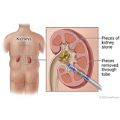Health Library
Our Health Library information does not replace the advice of a doctor. Please be advised that this information is made available to assist our patients to learn more about their health. Our providers may not see and/or treat all topics found herein.
Percutaneous Nephrolithotomy or Nephrolithotripsy
Current as of: April 9, 2025
Author: Ignite Healthwise, LLC Staff
Clinical Review Board
All Ignite Healthwise, LLC education is reviewed by a team that includes physicians, nurses, advanced practitioners, registered dieticians, and other healthcare professionals.
Urology Conditions
- Men’s Health
- Male Infertility
- Overactive Bladder
- Painful Urination (Dysuria)
- Prostate Cancer
- Prostatitis
- Restless Leg Syndrome
- Sexually Transmitted Diseases (STDs)
- Sleep Disorders
- Testicular Cancer
- Undescended Testicles
- Urinary Disorders
- Urinary Incontinence
- Urinary Tract Infection (UTI)
- Vaginal and Pelvic Prolapse
- Yeast Infections
Heart IconHealthy Lifestyles
Tips on how to stay healthy.
Healthy Eating | Fitness & Exercise
clickInteractive Tools
- How Bad Are Your Urinary Symptoms From Benign Prostatic Hyperplasia (BPH)?
- Which Health Screenings Do You Need?
- What Is Your Stress Level?
- How Well Do You Bounce Back?
- Symptom Checker




